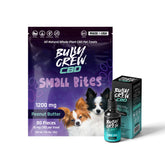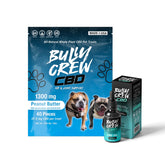Many dog owners are turning to natural ingredients to boost their pets' health — olive oil is one of the most talked-about options. But before adding it to your dog's bowl, it's essential to ask: Can a dog have olive oil safely? And more importantly, is olive oil good for dogs in the long run? From improving coat shine to supporting digestion and even helping with allergies, olive oil may offer various potential benefits. In this article, we'll break down what makes this everyday kitchen staple a potentially smart addition to your dog's diet — and what you need to know before you start using it.
Olive Oil and Dogs' Skin Health
The primary reason many pet owners consider olive oil is its undeniable impact on skin and fur. Just like in humans, a dog's coat is a reflection of their internal health, and optimal nutrition is paramount for that coveted shine.

Olive oil is a treasure trove of nutrients that play a crucial role in maintaining a dog's dermal (skin) and fur health. These include powerful antioxidants like vitamin E, essential omega-3 fatty acids, and beneficial polyphenols. Research indicates that consuming foods rich in antioxidants is beneficial for overall health, and vitamin E specifically helps protect cells from damage. Omega-3s are vital for healthy cell membranes and reducing inflammation, which directly impacts skin condition and coat quality. Polyphenols further contribute to cellular health and can protect cells from oxidative damage.
Veterinary dermatologists have observed noticeable improvements in luster and shine in the coats of dogs whose diets were supplemented with olive oil. While individual results may vary, a visible difference often takes about 30 days to become apparent.
It's important to clarify, however, that applying olive oil directly to a dog's coat or skin is generally not recommended. Most dogs, with their innate curiosity and love for anything edible, will try to lick off every last drop. This not only negates any potential topical benefits but could also cause further skin irritation due to excessive licking. The true magic of olive oil for coat health comes from within, by supplementing the diet.
Other Benefits of Olive Oil for Dogs
Beyond its remarkable effects on skin and coat, olive oil offers a range of additional potential health advantages for your canine companion:
May Reduce Itching from Allergies
Just like their human companions, many dogs suffer from allergies. Common culprits include environmental allergens like pollen, dust mites, and flea saliva. These allergic reactions can manifest as intensely inflamed and itchy skin, leading to discomfort, excessive scratching, and even secondary skin infections. Finding relief for an itchy dog is a top priority for any concerned owner.
Olive oil is primarily made up of a monounsaturated fat called oleic acid. This particular healthy fat is increasingly recognized for its potent anti-inflammatory properties. When consumed, these anti-inflammatory compounds can work systemically, helping to calm the body's overactive immune response that triggers allergic itching. Studies have shown that the anti-inflammatory effects of certain fatty acids, including oleic acid, can be beneficial in managing inflammatory conditions. Some veterinary experts suggest this property may help ease the itching caused by allergies. While olive oil isn't a cure for allergies, it can serve as a supportive dietary addition that may help alleviate the symptomatic discomfort.
Olive oil and dogs' Digestive Health
A healthy digestive system is foundational to a dog's overall well-being, impacting everything from nutrient absorption to mood. When a dog struggles with digestive issues, especially constipation, it can be a source of significant discomfort and concern.
Due to its natural properties as a gentle lubricant and its slight laxative effect, olive oil may support dogs struggling with constipation when given in modest portions. It works by subtly softening the stool and promoting smoother passage through the digestive tract. It's crucial to slowly integrate olive oil in dog food, starting with just a few drops, and to monitor their response closely. Digestive systems can be sensitive, and too much too soon can backfire. If adverse gastrointestinal issues such as diarrhea, vomiting, or increased flatulence arise, it's a clear signal to discontinue giving your dog olive oil and consult your vet. Beyond constipation, some veterinary insights suggest that the healthy fats in olive oil may also aid in nutrient absorption, particularly for fat-soluble vitamins, further supporting overall gut health and contributing to satiety, which means dogs feel full longer.
Read this also: How CBD as an Appetite Stimulant for Dogs Is Helping Picky Eaters
May Support Weight Management
Obesity is a growing concern in the canine population, leading to a host of health problems, including joint pain, diabetes, and reduced lifespan. While calorie control and exercise are paramount for weight management, specific dietary components can be supportive.
The monounsaturated fats found abundantly in olive oil can help in the complex process of breaking down fat inside fat cells. This mechanism may contribute to helping your dog lose weight or reduce their overall risk of obesity. It's important to understand that adding fat to a diet to lose weight might seem counterintuitive, but healthy fats can promote satiety (feeling full) and positively influence metabolism. Research has indicated that healthy fats can reduce fat around the abdomen, help promote healthy blood flow, and reduce insulin sensitivity.
May Enhance Disease Prevention
While no single food is a magical cure-all, incorporating olive oil into your dog's diet may offer long-term benefits that contribute to their overall longevity and vitality. The protective compounds within olive oil can help your beloved dog stay by your side a bit longer and live a healthier life.
One of olive oil's most significant contributions is its rich antioxidant content, particularly vitamin E and polyphenols. Antioxidants are vital for combating free radical damage in cells. Free radicals are unstable molecules that can cause oxidative stress, leading to cellular damage and contributing to the development of various chronic diseases, including cardiovascular disease and certain types of cancer. By providing a shield against this cellular assault, olive oil may help protect your dog's cells and potentially reduce the risk of these serious illnesses. Studies have shown that antioxidants help reduce the risk of various diseases.
Important Considerations for Adding Olive Oil to Your Dog's Diet
While the benefits are promising, responsible integration of olive oil into your dog's diet is key:
-
Always Choose Extra Virgin Olive Oil (EVOO): This is the highest quality olive oil, produced by cold-pressing olives. It retains the most nutrients, antioxidants, and beneficial compounds. Avoid refined or light olive oils, which have undergone processing that diminishes their health benefits.
-
Moderation is Paramount: Olive oil is calorie-dense. Even a small amount of olive oil for dogs adds significant calories. Overfeeding can lead to weight gain, digestive upset (like diarrhea), or even pancreatitis in sensitive dogs. Start with a very small amount (e.g., a few drops for small dogs, ¼ teaspoon for medium dogs) and gradually increase.
-
Consult Your Veterinarian: Before making any significant changes to your dog's diet, especially if they have existing health conditions (like pancreatitis, sensitive stomachs, or obesity concerns), always consult your veterinarian. They can provide personalized advice on appropriate dosages and monitor for any potential interactions or adverse effects.
-
Introduce Slowly: Sudden dietary changes can upset a dog's stomach. Introduce olive oil gradually over several days to allow their digestive system to adjust.
-
Mix it In: The easiest way to administer it is to drizzle olive oil and mix it in dog food.
Consider Bully Crew CBD's Wholesome Dog Treats
Beyond adding olive oil directly to their food or as part of a homemade recipe, there are also excellent pre-made options that combine beneficial ingredients in a convenient and delicious form. Bully Crew CBD offers wholesome treats that naturally complement a healthy diet. Their CBD Pet Treats contain whole-plant, full-spectrum hemp extract CBD in every square. Made with high-quality, human-grade ingredients like almond flour, low-sodium vegetable broth, olive oil, and peanut butter, these treats ensure you're giving your dog a delicious and quality snack. They are a perfect addition to your dog's daily routine, blending great taste with potential wellness benefits.
Conclusion
So, can dogs eat olive oil? The answer is Yes, but in moderation. From enhancing the natural sheen of their fur to potentially supporting digestion, weight management, and long-term disease prevention, olive oil offers a holistic array of benefits for our canine companions. It's a simple, natural addition that can contribute significantly to their overall health and vitality. By understanding its properties and incorporating them responsibly and in moderation, you can give your dog that coveted golden glow, knowing you're nourishing them from the inside out. Your dog's radiant coat, and perhaps even their prolonged vibrant health, might be the shinier testament to this simple, golden ingredient.







